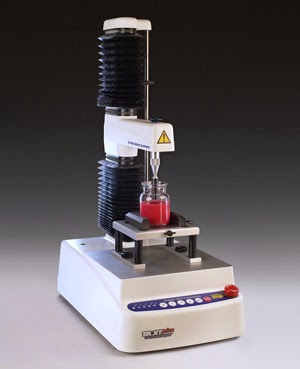At Croda they use their TA.XTplus Texture Analyser to put hair tresses to the test. As an example, the effectiveness of personal care products on the physical characteristics of hair are assessed, with the bending force of a hair bundle used as an indicator of softness. Different types of hair are tested, comparing results before and after the application of various hair treatments.
For the test, the hair samples are divided into two bundles – one to undergo treatments, the second to be used as a control. An average bending force from a cycle of ten three-point-bend tests is calculated for each sample.
This type of research helps Croda to reveal that oxidation following hair bleaching, as well as heightened environmental moisture levels, have a significant effect on measurable bending force, an indication of hair softness, in particular where damaged hair is concerned. It also demonstrates the efficacy of conditioner formulations containing new softening ingredients.
How BASF measures the performance of hair styling polymers
BASF used their TA.XTplus Texture Analyser to develop, for example, a new polymer generation for hair styling, offering truly multifunctional performance. The excellent performance of today’s styling formulations is further optimised by the use of polymer combinations, especially in gel and wax formulations. Combinations of styling polymers and polymeric thickeners are used to achieve the right balance of rheology profile, setting performance and humidity resistance, without sacrificing sensory properties such as peaking, gel structure and clarity.
Many of those formulations still contain old fashioned PVP-based polymers, acrylic-based polymers and Carbomer-based thickeners. Formulations with the new multifunctional performance polymer by BASF offer an opportunity to go the opposite way, reducing the complexity of styling gel and wax formulations by the use of only one polymer.
How Momentive Performance Materials substantiate the effectiveness of their conditioning agents
Momentive Performance Materials Inc., a major manufacturer of silicones for the personal care sector, installed world-leading texture analysis technology to explore and substantiate the effectiveness of Silsoft Silk* conditioning agent. Thanks to the TA.XTplus Texture Analyser, Momentive now has detailed convincing data showing the effectiveness of their conditioning agent in various shampoo and conditioner applications.
The Texture Analyser was used to measure wet friction – an excellent indicator of hair damage – comparing the effects of different silicones on damaged hair samples. Momentive worked with Texture Technologies Corp (TTC), distributor of the TA.XTplus in the US, to develop standardised test protocols and measurement parameters that are now used by Momentive to hone the chemistry of its products and by its customers to hone their shampoo and conditioner formulations utilising Momentive’s products.
“Objective, quantifiable test results like these are invaluable to Momentive,” said Anne Dussaud, senior scientist at Momentive. “They show us very clearly not only how effective our silicone polymers can be in their own right, but also compared to the other actives our customers can choose from. We use these tests primarily as an R&D tool, which guides our decisions about the selection of polymers or to collaborate with customers about optimising their formulations.”
The wet friction assessments were complemented by wet and dry combing tests and human sensory panels which gave a fully rounded view of the silicones’ efficacy. In addition to testing shampoo and conditioner performance, Momentive’s personal care lab deployed its texture analyser to measure the hardness of pressed powders and lubricant friction force.
There is huge potential for texture analysis in the personal care sector. This is a large and highly competitive market where proven claims on packaging and in advertising play a vital role in consumers’ purchasing decisions. So, for manufacturers knowing exactly how the ingredients they choose will improve the performance of their products is ideal. Human sensory panels are indispensable, but increasingly now, so is objective texture analysis.
There is a Texture Analysis test for virtually any physical property. Contact Stable Micro Systems today to learn more about our full range of solutions.
For more information on how to measure texture, please visit the Texture Analysis Properties section on our website.
 The TA.XTplus texture analyser is part of a family of texture analysis instruments
and equipment from Stable Micro Systems. An extensive portfolio of
specialist attachments is available to measure and analyse the textural properties of a huge range of food products. Our technical experts can also custom design instrument fixtures according to individual specifications.
The TA.XTplus texture analyser is part of a family of texture analysis instruments
and equipment from Stable Micro Systems. An extensive portfolio of
specialist attachments is available to measure and analyse the textural properties of a huge range of food products. Our technical experts can also custom design instrument fixtures according to individual specifications.
No-one understands texture analysis like we do!
To discuss your specific test requirements click here...
For more information on how to measure texture, please visit the Texture Analysis Properties section on our website.
 The TA.XTplus texture analyser is part of a family of texture analysis instruments
and equipment from Stable Micro Systems. An extensive portfolio of
specialist attachments is available to measure and analyse the textural properties of a huge range of food products. Our technical experts can also custom design instrument fixtures according to individual specifications.
The TA.XTplus texture analyser is part of a family of texture analysis instruments
and equipment from Stable Micro Systems. An extensive portfolio of
specialist attachments is available to measure and analyse the textural properties of a huge range of food products. Our technical experts can also custom design instrument fixtures according to individual specifications.No-one understands texture analysis like we do!
To discuss your specific test requirements click here...





No comments:
Post a Comment